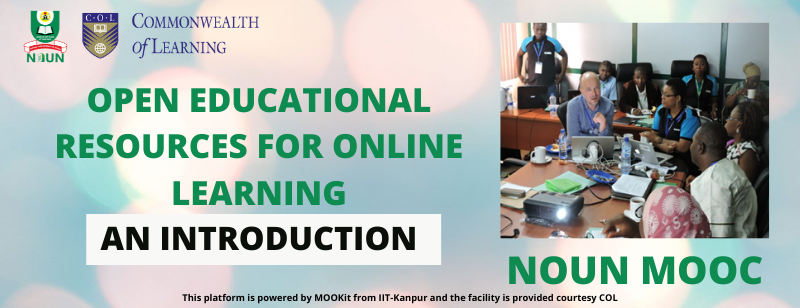NOUNMOOC

This portal is now inactive, and certificates are no longer issued. The Commonwealth of Learning (COL) will archive and provide access to the content. Visit https://oasis.col.org/ for more details.
Course Description
Open Educational Resources (OERs) is defined as “teaching, learning and research materials in any medium, digital or otherwise, that reside in the public domain or have been released under an open license that permits no-cost-access, use, adaptation and redistribution by others with no or limited restrictions” (UNESCO 2012). Understanding the concept of OER and its integration in online learning is crucial in the face of the pandemic necessitating a paradigm shift in teaching and learning. This is a 4-week course designed for educational administrators and planners, teachers, trainers, researchers and individuals with interest on how to use Open Educational Resources for teaching and learning. The course aims at creating awareness on the importance and use of OERs in online learning as well as capacity building in this area.
Course Contents
Week 1: Becoming Familiar with OER
Intended Learning Outcome
- Distinguish an OER from other sources
- Explain the 5 Rs that characterised a copy-right free resource
- Describe the events that led to the advent of contemporary OER
- Appreciate the benefits of OER
Unit 1: Defining OER
Unit 2:Types and Characteristics of OER
Unit 3: Historical Background: Actors and Triggers
Unit 4: OER Declarations and Action Plan
Unit 5: Benefits of OER
Week 2:Becoming Familiar with Online Learning
Intended Learning Outcomes
By the end of this week, you will be able to:
- Recognise the different levels of online learning
- Explain online learning pedagogy and theories
- Select effective online learning environment
- Identify different online learning tools
Unit 1:Concept of Online Learning
Unit 2: Pedagogy in Online Learning
Unit 3: Online Learning Environment
Unit 4: Online Learning Tools
Unit 5: Learning Devices
Week 3: Identifying, Using, and Creating OER in Online Learning Environment
Intended Learning Outcomes
By the end of this week, you will be able to:
- Identify open licensed resources
- Find OERs
- Create OERs for online learning
- Deploy OERs using appropriate channels
Unit 1: Open Licenses
Unit 2:; Finding OERs
Unit 3: Using OERs
Unit 4: Creating OERs
Unit 5: Deploying OERs
Week 4: Applying OER in Online Learning Course Planning
Intended Learning Outcomes
By the end of this week, you will be able to:
- Generate adequate intended learning outcomes
- Select appropriate learning activities based on the generated learning outcomes
- Select appropriate learning resources based on the learning outcomes
- Identify appropriate types of assessment based on the learning outcomes
- Select appropriate OERs that meet the learning outcomes
Unit 1:; Learning Outcomes
Unit 2: Selecting Learning Activities
Unit 3: Selecting Learning Resources
Unit 4: What is the right Assessment?
Unit 5: Appropriate OER
Target audience
This course will be useful for educational administrators and planners, teachers, trainers, researchers and individuals with interest on how to use Open Educational Resources for teaching and learning.
Outcomes of this Course
It is expected that by the end of this course, you will be able to:
- Distinguish an OER from other sources
- Explain the 5 Rs that characterised a copy-right free resource
- Describe the events that led to the advent of contemporary OER
- Appreciate the benefits of OER
- Recognize the different levels of Online Learning
- Explain eLearning pedagogy and theories
- Select effective online learning environment
- Identify different online learning tools
- Find OER materials
- Create OERs for online learning
- Generate adequate learning outcomes
- Select appropriate learning activities based on the generated learning outcomes
- Select appropriate learning strategies based on the learning outcomes
- Identify appropriate types of assessment based on the learning outcomes
- Select appropriate OERs that meet the learning outcomes
Certificates
A Certificate of Completion can be awarded depending on active engagement in the discussion forums and completion of the assessments.
Copyright 2022· All rights reserved
Designed by Zymphonies

